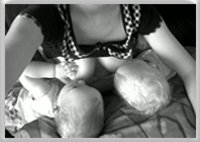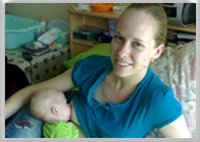Breastfeeding Twins And More...

Breastfeeding twins or higher multiples can be very nerve-wrecking at first. Having twins alters your entire family's lifestyle drastically. If not handled properly it can stay overwhelming for a long time.
Your attitude and the support of the people around you can turn this all around and speed up your recovery...both physical and emotional.
Multiple births is becoming more and more common. According to the American Academy of Pediatrics:
"It has increased 42 percent since 1990 and 70 percent since 1980."
Earlier the possibility of having twins was mostly genetics-related. It was known to skip a generation, which meant if your mom had a twin sister or brother, you were likely to have twin babies.
Nowadays the odds of multiple births are increased by frequent infertility treatments (which stimulate ovaries to release multiple eggs) and in vitro fertilization (when multiple fertilized eggs are implanted into the uterus).
Is It Possible To Breastfeed Twins Exclusively And Have Enough Milk?
Many women succeed in breastfeeding twins to the same degree as the ones breastfeeding single babies. A woman is capable of producing enough milk to nurse twins and higher multiples (same way she is capable of tandem nursing - nursing two siblings):
- Multiple birth babies come from either multiple placentas or one enlarged placenta. Either way there are more placental cells, which gives your body a signal to produce more milk-making cells in the breasts.
- In addition, breast milk production is a supply-demand mechanism. With twins there is double the sucking, double the stimulation, double the amount of prolactin and ideally double the production.
So physiologically a woman is absolutely capable of breastfeeding multiples. Practically, it is of course, a lot of work for the entire family.
Decision to formula-feed a baby out of fear of not producing enough milk is usually premature. Visit Twins Breastfeeding Tips section for a list of 12 most useful tips to make breastfeeding twins easier.
Breastfeeding Multiples Challenges
Having twins, mothering multiples and breastfeeding them exclusively is a difficult, but rewarding job. These are some possible challenges that you may face and ways to handle them:
*Born early
Most twins and higher multiples (triplets, quadruplets, quintuplets, sextuplets, septuplets, octuplets, etc.) are born from weeks to months prematurely and have to stay at the hospital until their growth and health stabilize.
A mother may not be able to breastfeed premature babies. In fact, many preemies are unable to even take a bottle and are only fed through a tube or a finger.
Mothers of hospitalized preemies face the challenge of finding ways to establish and maintain their milk supply by means of pumping, hand expression or breastfeeding someone else’s baby. The last method is not as popular nowadays as it used to be 30-40 years ago.
*Learning to nurse
Most twins are weaker and smaller than single birth babies and therefore need additional time to learn to latch on correctly.
Many moms of multiples report easier adjustment period, if they took classes preparing women for breastfeeding twins and multiples and joined local groups. Women have been breastfeeding twins for ages, there is hardly any issue that has not yet been experienced by someone before. No need to re-invent the wheel. Talk to other moms, join forums, meet up with other mothers of twins.
*Feeding schedule
Feeding schedule of twins or other multiple babies is usually the opposite of what we hope for and what works best for the mom. It takes a good couple of months to synchronize napping and feeding times. During these first months babies want to sleep and eat at random times, which can be exhausting, to put it mildly.
Take it easy, let your babies lead, ask for help and sleep when your babies sleep. With time you all will work out a schedule. And you will be able to breastfeed your babies simultaneously to save time. Here is how to position babies for nursing.
*Physiological and behavioral differences
Twins and other multiples can be born out of one egg – identical or separate eggs – fraternal twins. In most cases, twins are born very different in their biological cycles and behavioral characteristics.
Identical twins are the same sex babies identical in
appearance. It is very natural to expect them to be in sync with each other.
This is, however, not true in most cases, at least during the first couple of
months. They may reveal close bond and similarity later in life. At first,
they are very different in their weight gain pattern, build-up, activity level and
temperament.Treat every baby as an individual. They better be different - it will ease their future lives.
Home › Breastfeeding Twins



















